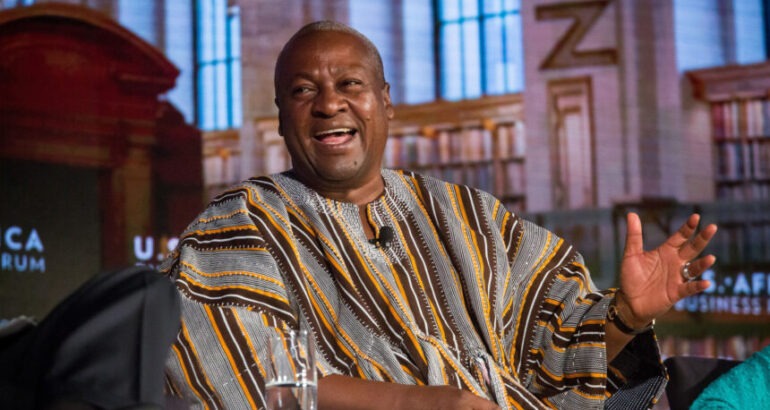Former Ghanaian president John Dramani Mahama has announced plans to renegotiate the terms of Ghana’s International Monetary Fund (IMF) bailout and increase local ownership in future oil and mining projects if he wins the presidential election in December.
Mahama, who served as president from 2012 to 2016, detailed his economic recovery strategy in an interview with Reuters, citing his previous experience with IMF negotiations. “I’ve been in an IMF programme before, when I was president, and I know that the IMF is not averse to sitting and talking and renegotiating issues,” Mahama, 65, explained.
Ghana defaulted on most of its $30 billion external debt in 2022, worsened by excessive borrowing, the COVID-19 pandemic, the war in Ukraine, and rising global interest rates. In May 2023, the country secured a $3 billion IMF bailout and subsequently reached agreements with bilateral and commercial creditors to restructure debts and freeze repayments until 2025. The IMF has already disbursed $1.56 billion, with an additional $360 million expected by December. Mahama aims to secure more IMF funds to help Ghana manage its debt repayments.
He also plans to amend public finance management laws to enforce a debt-to-GDP ceiling of 60-70%, preventing excessive borrowing. Mahama assured that he would honor existing production contracts with oil and mining companies and avoid raising taxes, instead focusing on securing higher royalties from future projects. He proposed increasing government stakes in future projects through the Minerals Income and Investment Fund, a sovereign wealth facility.
Former Ghanaian president John Dramani Mahama has announced plans to renegotiate the terms of Ghana’s International Monetary Fund (IMF) bailout and increase local ownership in future oil and mining projects if he wins the presidential election in December.
Mahama, who served as president from 2012 to 2016, detailed his economic recovery strategy in an interview with Reuters, citing his previous experience with IMF negotiations. “I’ve been in an IMF programme before, when I was president, and I know that the IMF is not averse to sitting and talking and renegotiating issues,” Mahama, 65, explained.
Ghana defaulted on most of its $30 billion external debt in 2022, worsened by excessive borrowing, the COVID-19 pandemic, the war in Ukraine, and rising global interest rates. In May 2023, the country secured a $3 billion IMF bailout and subsequently reached agreements with bilateral and commercial creditors to restructure debts and freeze repayments until 2025. The IMF has already disbursed $1.56 billion, with an additional $360 million expected by December. Mahama aims to secure more IMF funds to help Ghana manage its debt repayments.
He also plans to amend public finance management laws to enforce a debt-to-GDP ceiling of 60-70%, preventing excessive borrowing. Mahama assured that he would honor existing production contracts with oil and mining companies and avoid raising taxes, instead focusing on securing higher royalties from future projects. He proposed increasing government stakes in future projects through the Minerals Income and Investment Fund, a sovereign wealth facility.
– Advertisement –
Mahama, representing the National Democratic Congress (NDC), is the main challenger to Vice President Mahamudu Bawumia of the ruling New Patriotic Party (NPP). The NPP is facing criticism due to the severe economic crisis, leading to its declining popularity.
Mahama became president in 2012 following the death of John Evans Atta-Mills and won an election later that year. He lost the 2016 and 2020 elections to NPP’s Nana Akufo-Addo, who will step down after this year’s vote, having served the maximum two terms. Mahama’s tenure was marked by significant infrastructure investments but criticized for power shortages, macroeconomic instability, and political corruption allegations, although he was not personally implicated.
At his campaign launch, Mahama addressed the dire economic situation, resonating with supporters like Abdul-Wakil Neindow, who lost his construction job in 2017. “We the youth are hopeless, we don’t have jobs. How to eat, pay bills and feed our families is very hard,” Neindow said.
Ghana, known for its stable democracy and peaceful power transitions, has never seen a party win more than two consecutive terms. The last election faced opposition accusations of unfair influence by the government, which it denied. Mahama urged supporters to remain vigilant after voting to prevent any potential vote-rigging.


